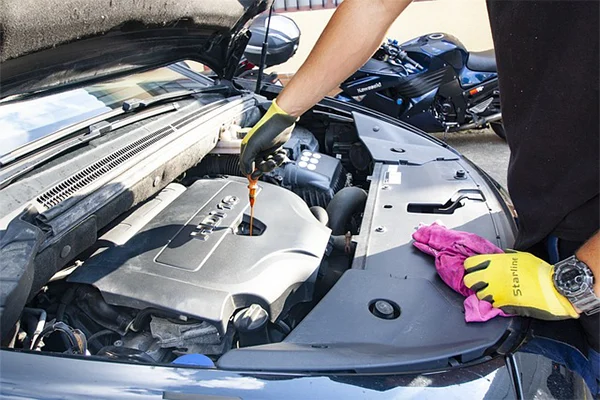Diesel Truck Maintenance Checklist
If you own a diesel truck, there’s a good chance you’re using it for work, towing, off-roading, or more. These are some of the toughest and most rugged vehicles on the road with a wide range of capabilities, so maintenance is crucial for retaining the performance and utility that make these vehicles so useful.
So, what does that entail? Though gasoline and diesel-powered motors share many necessary maintenance services, diesel engines also bring their intricacies and needs that any diesel owner should know. In this article, we’ll share a list of services you should be extra aware of to keep your truck running its best.
5 Essential Diesel Truck Services
Glow Plugs
Contrary to the spark plugs that are used to ignite the gasoline/air mixture in most motors, diesel engines instead use glow plugs. Since diesel is ignited by pressure from the piston, these engines do not need spark plugs to create combustion. Alternatively, diesels use glow plugs to help the combustion chamber reach the optimal temperature and pressure for ignition when starting the engine initially.
Like spark plugs though, these components will gradually wear over time and eventually fail. Keeping an eye on your glow plugs and replacing them around the 100,000-mile mark is the best way to ensure your truck starts right up even on the coldest of mornings.
DEF Filter Replacement
Modern diesel vehicles are required to include a diesel exhaust fluid (DEF) system. DEF essentially acts as a catalytic converter, removing toxic compounds from the exhaust gasses of your diesel vehicle. Unlike catalytic converters though, DEF is a consumable fluid and is continuously injected into the exhaust stream.
Between the DEF tank and injector sits a filter, which removes any contaminants from the fluid before being introduced to the exhaust. This filter often goes forgotten about but will accumulate contaminants and debris over long periods of use. If not replaced, it could disrupt the delivery of DEF and inhibit its ability to react with toxic gasses. In some cases, this could lead to a drop in fuel economy, an illuminated warning light, and an inability to pass emissions testing.
Generally, these filters last for a very long time. You could expect to start looking at a replacement anywhere between 120,000-150,000 miles.
Diesel Particulate Filter Cleaning/Replacement
Another diesel-specific emissions device to mitigate environmental damage is the diesel particulate filter (DPF), which has been required on new diesel vehicles since 2008 in the United States. DPF systems usually work in conjunction with a DEF system, not as an alternative.
While the DEF filter removes contaminants from the diesel exhaust fluid, DPFs do the same for the exhaust gasses themselves. DPFs accomplish a similar job as catalytic converters just in a different way, located downstream in the exhaust system to catch toxic compounds before exiting the pipe.
The exact design of DPF systems varies by vehicle, but all have the end goal of removing soot and carbon particulates. When these filters become gunked up with black soot, they can create blockages within the system. A blocked DPF will lead to a host of issues in your vehicle, including but not limited to a warning light, low MPG, thick black smoke on acceleration, trouble starting, or even an inability to start at all.
In general, most DPFs will last well past the 100K mile mark, however, the rate at which yours accumulates soot will depend on a variety of factors. To give your filter the longest lifespan possible, you can have your filter cleaned by a professional roughly every six months to a year. This will remove the existing soot and provide exhaust gasses free passage through the system while still catching harmful particles.
Stay Up to Date on Oil and Filters
Oil and filter service is crucial to keep any engine running, and that holds just as true for diesels as well. Allowing old and contaminated oil to run through your diesel motor can cause it to gunk up the intricate passages in your engine block, eventually leading to overheating and the serious harm that comes with that.

A general rule of thumb is to have a full oil and filter service performed every 3,000-5,000 miles, but this number depends on various circumstances such as the model of the vehicle, how it’s driven, and the type of oil used.
Keep an Eye on Your Gaskets
Diesel engines produce higher pressure during combustion, which puts increased stress on the important gaskets keeping your engine airtight. It’s for this reason that you should pay a little extra attention to the gaskets surrounding your engine, the head gasket in particular.
Light Diesel Services in Tucson, Mesa, and Phoenix
If you’re the owner of a diesel SUV or pickup and need expert advice, inspections, diagnosis, and/or repair, trust the ASE Certified diesel technicians at Borst Automotive! We have four locations, two in Tucson and one in both Mesa and Phoenix, equipped with the training and tools to properly care for the vehicles that help you get stuff done. Give us a call or schedule online today!

Borst Automotive is here to help when you need it. Give us a call, schedule an appointment, or stop in today!
